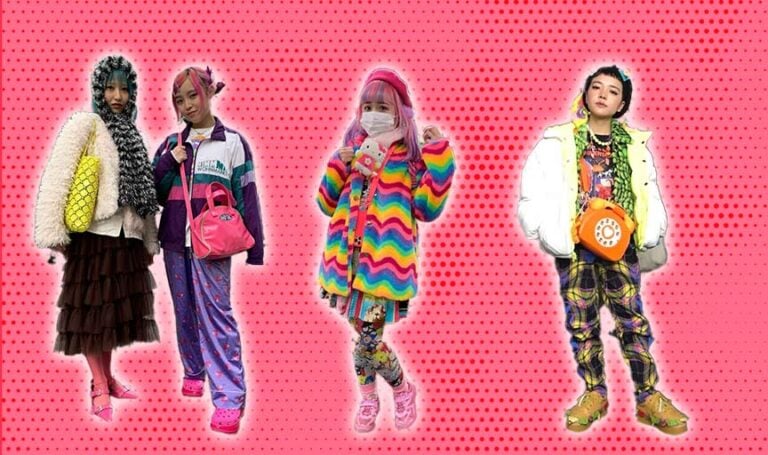Why Harajuku fashion is making a comeback in both Gen Z culture and aesthetics
Harajuku style is a vibrant and eccentric subculture that embraces the unconventional. Originating in Tokyo’s Harajuku district in the 1970s, the area’s rich history of alternative fashion has evolved into a diverse collection of aesthetics, ranging from cute and casual to extreme and maximalist. Tokyo has long been renowned for its expressive fashion scene, with the Japanese fashion district of Harajuku serving as a hub for some of the boldest fashion tribes recognisable globally. Now, years after its initial debut, the resurgence of Harajuku style is taking over.
@cybr.grl I miss Jojo Siwa’s bow era 🎀 #decorafashion #decorakei #harajukufashion #デコラ #デコラファッション #デコラ系 #原宿系
♬ original sound - @.danganr0npaa
What is Harajuku style?
Harajuku fashion doesn’t embody a single defined style, but rather a fusion of different aesthetics and genres. While encompassing a wide array of fashion expressions, its essence revolves around a sense of community, freedom of expression, and a little sartorial eccentricity thrown in for good measure. “Many Harajuku fashion styles are born from rebellion against the uniformity of Japanese culture, a society built on keeping up appearances and prioritising others. I think that’s what resonated with people, this desire to visually speak out and express,” UK-based fashion content creator Addy Somers told SCREENSHOT.
Harakjuku as a subculture allows people to break free from conventional personal style norms by exploring unorthodox fashion choices, and FRUiTS magazine was a cultural cornerstone of Harajuku street fashion. Founded in 1997 by photographer Shoichi Aoki, this Japanese publication documented the distinctive styles of various youth groups frequenting the Harajuku neighbourhood. Within its pages, nostalgic meets futuristic meets uncategorisable outfits were featured, leading Phaidon to release a book bearing the magazine’s name in 2001. And decades later, as Harajuku fashion enters mainstream discourse once again, the inaugural edition of FRUiTS is being made available in English as an EPUB.
However, the Westernization of Japanese Harajuku fashion hasn’t always been approached with sensitivity. Gwen Stefani has notably appropriated numerous elements of the subculture, frequently featuring Harajuku girls as her backup dancers and cherry-picking aspects of the subculture that suited her image. And others such as Nicki Minaj, who has long been known as the Harajuku Barbie, draw inspiration from the subculture without giving credit where credit is due. Thankfully, 2024 looks set to undo fashion wrongs as community credentials become core to Harajuku’s widespread appeal.
Videos relating to #harajukufashion currently have over 671 million views on TikTok and some of the most popular street style videos have over 878,000 views and 44,000 views respectively.
“I think social media serves an important role in educating others on these styles and also encouraging intersectionality with self-expression,” notes Somers. “There are so many amazing Black/POC/plus-size creators who challenge the beauty standards of fashion and femininity, allowing young people to see creators who look like them have confidence in themselves. I also think social media serves as the best way to communicate with a younger and more digital audience.” It’s the viral nature of Harajuku fashion and its ability to grab people’s attention that keeps it a focal talking point for those inside and outside of its walls.
One creator at the heart of this Harajuku vibe shift is Aliyah Bah. Bah has cultivated her own distinctive aesthetic, blending elements of Y2K, alternative fashion, and Harajuku styles, which has earned traction online under the moniker ‘Aliyahcore’ and gained Bah over 2.8 million TikTok followers and 922,000 Instagram followers in the process. Her eclectic looks have also earned Bah celeb fans such as Lizzo, who showcased her interpretation of Aliyahcore fashion on Instagram with a shoutout to Bah in the caption, leading the pair to link up IRL.
@aliyahsinterlude New video on how to style #aliyahcore on my youtube channel , link in bio cuties 🤭💕💖💓💗 #fyp #aliyahcore
♬ original sound - aliyahsinterlude
Subculture fashion revolves around a shared sense of belonging, where people bond over similar or identical fashion choices, fostering online and offline camaraderie. While the dedication to subcultural aesthetics isn’t as strong as it used to be, Harajuku lives on through TikTok educators who are explaining its deeper significance. It perseveres even as stylistic expressions shift, reflecting the diversity and nuance of its growing fandom.
@cybr.grl Replying to @♡ Harajuku is for me and YOU 💖 src: A Brief History of Harajuku Culture by strikemagazines.com #harajuku #harajukufashion #jfashion #fruitsmagazine #japanesefashion #decorafashion #decorakei #neoデコラ会 #kawaiifashion
♬ original sound - 💖🌈 cybr.grl 🌈💖
“Harajuku fashion offers a borderless horizon of self-expression. You not only have pre-established styles with their own unique histories but also communities around them that encourage and educate,” Somers adds.
Many of the distinctive looks found in Harajuku street wear aren’t easily identifiable as belonging to specific communities. Whether cute or extreme, subtle or glaringly obvious, Harajuku fashion encompasses a spectrum of aesthetics. “We have so many scary changes in bodily autonomy for women, and now more than ever young girls are sexualised in public and the media,” says Somers. “So a fashion style like Lolita allows women to explore a different avenue of the feminine that actively rebels against the male gaze.”
From the Lolita subculture, which focuses on classic and sweet styles, to Kogal or kogyaru fashion, which is inspired by Japanese high-school uniforms, to cosplay which draws on aspects of anime culture, Harajuku blends unique styles and subcultures to serve all.
What sets Harajuku street style apart, however, is its propensity to do something a little different in an era where fashion conformity is everywhere. As one Reddit thread poses the question of whether the Harajuku street fashion scene is really dead, the answer is telling of its future. “The headline-grabbing kawaii fashion scene that attracted international attention in the 90s and 00s is mostly gone, because fashion trends have moved on. However, it remains a hotspot of creativity and cutting-edge fashion thinking, just in different ways that you might not expect. In many ways that’s more exciting.”
In terms of the evolving landscape of Harajuku fashion and its counter-cultural nature, Somers thinks this is something we’re only going to see more of in time to come. “I think Harajuku fashion will only get bigger. I feel with so many uncertainties in the world and a feeling of unrest in my generation and younger, we need rebellion. Harajuku fashion not only offers an alternative way of dressing, but an alternative way of thinking!”






